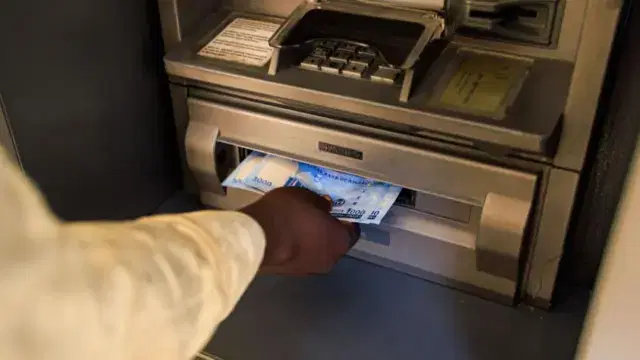In a move that has stunned Nigerians and financial experts alike, the Central Bank of Nigeria (CBN) has issued a directive that dramatically hikes charges on ATM withdrawals — a policy shift that threatens to unravel years of progress towards a truly cashless economy.
Disguised as an efficiency measure, the directive is being seen by many as a brazen betrayal of the very principles the CBN once championed: financial inclusion, digital banking, and ease of access to funds. The policy, set to take effect from March 1, 2025, not only imposes crippling fees but risks driving millions of Nigerians back into crowded, chaotic banking halls — reversing years of painstaking reform.
From Cashless Pioneer to Policy Saboteur
For years, the CBN urged Nigerians to embrace digital banking. Through aggressive campaigns, it promoted ATMs, POS terminals, and mobile banking as the future — a future where citizens could bypass frustrating queues and enjoy seamless transactions from virtually anywhere. Nigerians responded. They adapted. They trusted the system.
But now, that trust has been shattered.
Under the new directive, customers can only withdraw cash for free from ATMs operated by their own banks. Any withdrawal from another bank’s ATM — even within the same network — will attract a fee of N100 per N20,000 at on-site ATMs. The costs soar even higher at off-site ATMs, where charges could reach a staggering N500 per withdrawal. International withdrawals, meanwhile, will now be subject to acquirer-imposed fees, the specifics of which remain murky.
Even more troubling, the three free interbank withdrawals per month — a lifeline for millions — has been completely scrapped.
The financial math is brutal. A customer withdrawing N100,000 from an out-of-network ATM will now part with nearly N3,000 in fees — a steep departure from the previous modest charges. This isn’t just a policy shift; it’s a financial chokehold on already struggling Nigerians.
The Ripple Effect: From Banking Halls to POS Booths
The immediate consequence will be glaring: banking halls flooded with frustrated Nigerians who would rather brave endless queues than surrender their hard-earned money to exorbitant ATM fees. The very congestion ATMs were designed to eliminate will return with a vengeance.
And it doesn’t stop there. With ATMs becoming unaffordable, Nigerians will inevitably flock to POS agents for cash. Demand will skyrocket — and with it, POS service fees. In a country already grappling with runaway inflation and shrinking incomes, these cascading costs could push ordinary Nigerians to the brink.
A Direct Attack on Financial Inclusion and the Poor
This policy is more than just an inconvenience — it’s a dagger to the heart of financial inclusion. For years, the CBN proudly aligned itself with global development goals like the Sustainable Development Goals (SDGs), especially Goal 8 (Decent Work and Economic Growth) and Goal 9 (Industry, Innovation, and Infrastructure). This latest move stands in direct conflict with those aspirations.
Instead of deepening financial inclusion, the CBN’s new charges create a two-tier system: one where the wealthy can afford digital convenience, and the poor are driven back into physical banking spaces — excluded from the ease and efficiency they were once promised.
Policy Inconsistency: A Nigerian Tradition
The irony is bitter. This is the same Central Bank that spent years urging Nigerians to “go cashless.” The same institution that pressured businesses to adopt digital payments and discouraged cash handling. Now, through one circular, it is dismantling its own progress — creating confusion, distrust, and economic friction.
The contradiction is glaring, and the message to Nigerians is clear: the rules can change at any moment, and you’ll always pay the price.
A Call for Common Sense and Reform
To salvage what’s left of its credibility, the CBN must reconsider this ill-conceived policy. Instead of punishing Nigerians for using ATMs, the apex bank should incentivize banks to deploy more ATMs — especially in underserved rural areas. More machines, closer to the people, would reduce the reliance on interbank withdrawals in the first place.
Reinstating the three free interbank withdrawals per month would also soften the blow while preserving public confidence. Additionally, the CBN should regulate POS fees to prevent opportunistic price gouging when demand inevitably surges.
Crucially, the CBN must engage with the public before making drastic changes that affect millions. Financial institutions, civil society, and consumer advocacy groups should have a seat at the table — ensuring policies reflect the realities faced by ordinary Nigerians, not just the bureaucratic imagination of policymakers.
Conclusion: Nigerians Deserve Better
This is not merely about ATM fees — it’s about trust. Trust in institutions, trust in policy consistency, and trust in the promise of a modern, inclusive financial system. The CBN’s new charges threaten to unravel all of that, replacing hope with frustration and progress with regression.
So, as March 1 looms, one question hangs heavy in the air: Is the CBN really trying to improve efficiency — or is it pushing Nigerians back into the very banking halls they worked so hard to escape?
For now, the answer seems painfully obvious.





